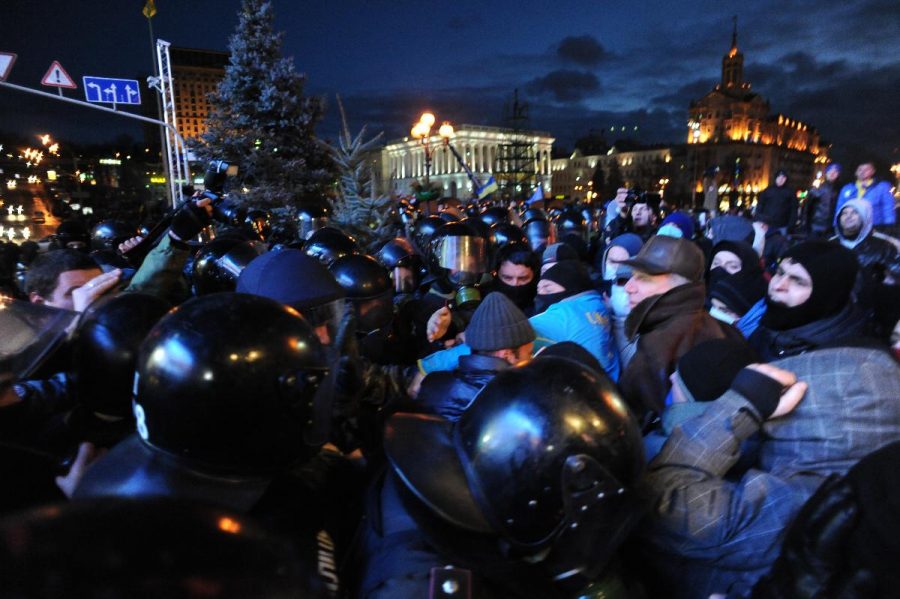Making sense of the Ukrainian crisis
Stefan Carlson takes a closer look at the Ukrainian crisis and encourages readers to be in prayer about the escalating situation.
The crisis continues in Ukraine. Stefan encourages readers to be in prayer during the continued conflict. | wikimedia.org/Creative Commons
March 26, 2014
.jpg)
I didn’t realize the significance of the Ukrainian crisis until I started reading about it last week.
BBC has has created a timeline of key events in an article called “Ukraine Crisis Timeline.” Protests began in November 2013 when Ukrainian president Viktor Yanukovych abandoned an agreement with the European Union in order to seek closer cooperation with Russia.
In December, 800,000 Ukrainian protesters filled the city hall and Independence Square of Kiev, Ukraine’s capital. In January of 2014, protests became violent. The violence escalated in February and by Feb. 20, 109 people had been killed.
President Yanukovych signed a compromise with leaders of the opposition on Feb. 21 and disappeared on Feb. 22. The day he disappeared, protesters took control of presidential administration buildings and parliament voted to remove the president from power.
On Feb. 27 and 28, Pro-Russian gunmen seized important buildings in Simferpool, the capital of Crimea. Crimea’s parliament drafted a referendum in order to secede from the Ukraine and be annexed by Russia. The referendum was supported by 97 percent of voters on March 16. The European Union and the United States responded by imposing travel bans and asset freezes on members of Russian president Vladimir Putin’s inner circle. The following day Putin signed a bill to absorb Crimea into the Russian Federation.
THE GLOBAL RESPONSE
According to the BBC, the European Union has suspended talks about closer economic cooperation between the E.U. and and Russia. Members of G8, a group of the world’s wealthiest nations, have expelled Russia because of its actions. The E.U. is implementing plans to support the new Ukrainian government through closer financial and political cooperation. The European Union has announced sanctions against 33 Russian and Ukrainian individuals and the U.S. has announced sanctions against at least 12 individuals associated with Russian president Putin and against a Russian bank called Rossiya.
THE GRAVITY OF THE SITUATION
According to the sources I’ve consulted, the question is not whether America should be involved, but how. Russia broke the agreement signed at Budapest that recognized Ukraine as a sovereign nation, and many speculate that Crimea is only the beginning. In an article published by CNN, Alexander Motyl, a professor and specialist on Ukraine, Russia and the USSR, notes that many Ukrainians believe a Russian invasion of mainland Ukraine is inevitable. He also observed that Putin’s ideological mentor, Aleksander Dugin, “insists that Russia’s goals go beyond Ukraine into Europe — a reunification of the Slavic peoples.” The buildup of Russian troops on the Ukrainian border makes this idea conceivable, and has caused concern for NATO’s top military commander and the Supreme Allied Commander Europe General.
THE WAY FORWARD
Most people agree that a military confrontation is in no one’s best interest. Remaining options include further economic sanctions and diplomatic conversations. Therefore, it is critical for the U.S. and other nations that have economic ties with Russia to apply more economic pressure than they currently are. These nations must work together to form a strategy that will apply sufficient economic pressure on Russia without putting one country at higher risk of potential Russian backlash than another.
It is also critical for European nations to utilize their own oil resources in order to decrease European dependence on Russian oil, as stated by economist and professor Peter Morici.
The Ukrainian people face the possibility of war everyday and have already lost loved ones. National leaders carry the weight of history-making decisions. May we assume a posture of prayer as we watch events unfold in the Ukraine.







